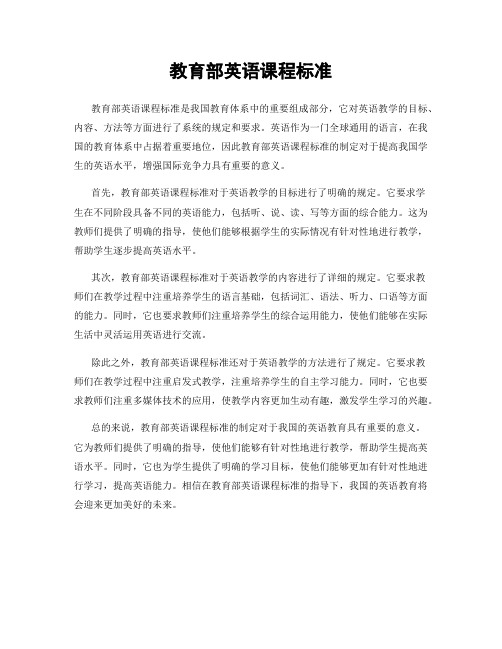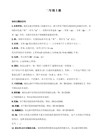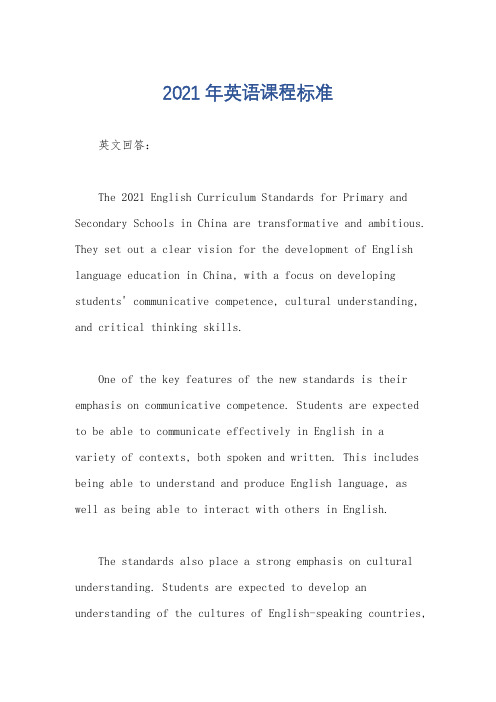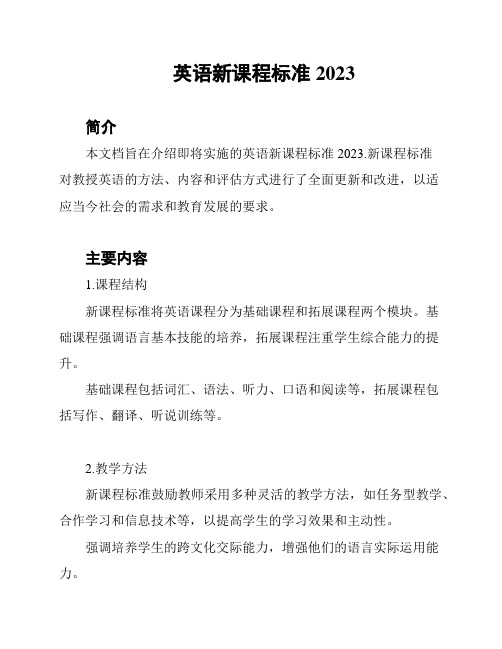英语语言学I 课程标准
教育部英语课程标准

教育部英语课程标准
教育部英语课程标准是我国教育体系中的重要组成部分,它对英语教学的目标、内容、方法等方面进行了系统的规定和要求。
英语作为一门全球通用的语言,在我国的教育体系中占据着重要地位,因此教育部英语课程标准的制定对于提高我国学生的英语水平,增强国际竞争力具有重要的意义。
首先,教育部英语课程标准对于英语教学的目标进行了明确的规定。
它要求学
生在不同阶段具备不同的英语能力,包括听、说、读、写等方面的综合能力。
这为教师们提供了明确的指导,使他们能够根据学生的实际情况有针对性地进行教学,帮助学生逐步提高英语水平。
其次,教育部英语课程标准对于英语教学的内容进行了详细的规定。
它要求教
师们在教学过程中注重培养学生的语言基础,包括词汇、语法、听力、口语等方面的能力。
同时,它也要求教师们注重培养学生的综合运用能力,使他们能够在实际生活中灵活运用英语进行交流。
除此之外,教育部英语课程标准还对于英语教学的方法进行了规定。
它要求教
师们在教学过程中注重启发式教学,注重培养学生的自主学习能力。
同时,它也要求教师们注重多媒体技术的应用,使教学内容更加生动有趣,激发学生学习的兴趣。
总的来说,教育部英语课程标准的制定对于我国的英语教育具有重要的意义。
它为教师们提供了明确的指导,使他们能够有针对性地进行教学,帮助学生提高英语水平。
同时,它也为学生提供了明确的学习目标,使他们能够更加有针对性地进行学习,提高英语能力。
相信在教育部英语课程标准的指导下,我国的英语教育将会迎来更加美好的未来。
英语语言学课程标准

8学时
语言学中的一些重要概念,如描写式和规定式、共时和历时、语言和言语、
提高内容:语言特征的重要性排序
拓展内容:不同语言学家对语言功能的分类
、基础内容:语音学和音位学、形态学、句法学、语义学、语用学
40学时
、提高内容:形态学和句法学的关系、句法学和语义学的关系、语义学和语用
8 0 基础内容
8 0 基础内容
/句法/语义 2 0 提高内容
2 0 拓展内容
语篇语言学 6 0 基础内容 社会语言学 6 0 基础内容
2 0 提高内容
2 0 拓展内容
64学时
-任务中-任务后”和“课前-课中-
刘润清 文旭 外语教学与研究出版社,2006.
、模板中的示例仅供编写时参考借鉴,不要机械套用。
、印刷排版格式:
为A4纸,页边距上3cm,下2.8cm,左2.7cm,右2.7cm;
:宋体小四号,固定行间距20磅,首行缩进2个字符;
1行;
0.5行;
2格,宋体小四加粗;
2格,宋体小四。
、拓展内容:语言学流派的介绍,包括历史语言学、现代语言学、布拉格学派、
模块三:宏观语言学模块
教学目标:了解跨学科研究语言的方法,掌握语篇语言学中的重要概念和代表性理
教学内容:
、基础内容:语篇语言学、社会语言学
16学时
、提高内容:认知语义学中的范畴概念、隐喻概念、转喻概念、像似性概念以及语
课程名称 英语语言学 课程编码 03024277(8) 课程类型及性质 通识教育平台, 工具与人文课程 考试/考查 考试 适用专业 英语 开课单位 外语系 总学时 64 总学分 4
、专业能力目标
整理《义务教育英语课程标准》解读课程价值、课程性质、课程理念、课程-2022年学习资料

确认英语课程的工具性和入文性双重属性 同样回答了为什么要在义务教育阶段开设英语 课程的问题: 不管是否使用外语, 学习外语都 是有意义的。 学习外语不仅可以(可能) 获得 一 交流工具, 而且能够促进人的全面发展。
修订要点 (3)修订稿仍然以描述学生 "用英语做事" 为主线 强调培养学生综合语言运用能力。 在做事情的过 程中发展语言能办 思维能力以及交流与合作的 能力。 修订稿在教学 议中从八个方面为英语教 师提出了既具有指导意义 又具有一定可操作性 的建议 修订 补充和完菁了教学实例 体现了 丛培^畿力为昱回幽改萤立回。 0
ቤተ መጻሕፍቲ ባይዱ
修订要点 (2)修订后的《标准》继续强调学习外语的过程是-个 积极主动地学习过程 一个不断提高语言运用能力和 人文素养的过程 语言学应迸-步丛重视语言和迟 的传援转@9;生绽 语言运围畿力的培羲 强调学 习外语的过程不再是一个枯燥地背诵和记忆的经历 而一个积极主动地学习过程 一个不断提高语言运用 能力和人文素养的过程。
三 英语课程性质英语课程不再是单纯的工具性课程 而是具有 工具性和人文性双重性质的课程。G1.什么样的课程是工具性课程? 2.什么样的课程是人文性课程?工具性人文性
英语课程的性质 (2001年)英语课程 既是学生通过英语学习和实践 活动 逐步掌握英语知识和技能 提高语言 实际运用能力的过程 9 又是他们磨砺意志 发展思维 拓展视野 丰富 活经验 发展 个性和提高人文素养的过程。
二, 认识英语课程的价值 在义务教育阶段开设英语课程不是个人意愿 也不是随意的决策 而是围家意志 , 是在国际视域下 基于国家战略发展目标 和人才培养目标而拟定的国家课程政策 1.英语课程对国家发展具有什么价值? 2.英语课程对学生发展具有什么价值?
英语课程标准的总目标

2022年义务教育英语新课标的总目标
一、学生应通过学习英语课程,达到发展语言能力的目的。
不只是会说、会写,新课标的课程目标希望通过英语学习,学生能够在感知、体验、积累和运用等语言实践活动中认识英语与汉语的异同,逐步形成语言意识,积累语言经验,进行有意义的沟通和交流。
不停留在单纯的为“用英语”而“学英语”,削弱学习的功利性,希望培养有意识形态的英语学习。
二、达到培养文化意识的目的。
学习一门语言,不只是运用语言,还能了解一个国家的风土人情和优秀文化。
新课标课程也鼓励通过英语学习了解不同国家的优秀文明成果,同时促进学生比较中外文化的异同,发展跨文化沟通和交流的能力,形成健康向上的审美情趣和正确的价值观,加深对中华文化的理解和认同,树立国际视野,坚定文化自信。
三、提升思维品质。
鼓励学生能够在语言学习中发展思维,在思维发展中推进语言学习。
初步从多角度观察和认识世界、看待事物,有理有据、有条理地表达观点;逐步发展逻辑思维、辩证思维和创新思维,使思维体现一定的敏感性、灵活性、创造性和深刻性。
四、提升学习能力。
树立正确的英语学习目标,保持学习的兴趣,主动参与语言实践活动,在学习中注意倾听、乐于交流、大胆尝试、学会自主探究,合作互助,学会反思和评价学习发展,调整学习方式,学会自我管理,提高学习效率,做到乐学善学。
2021年英语课程标准

2021年英语课程标准英文回答:The 2021 English Curriculum Standards for Primary and Secondary Schools in China are transformative and ambitious. They set out a clear vision for the development of English language education in China, with a focus on developing students' communicative competence, cultural understanding, and critical thinking skills.One of the key features of the new standards is their emphasis on communicative competence. Students are expected to be able to communicate effectively in English in avariety of contexts, both spoken and written. This includes being able to understand and produce English language, as well as being able to interact with others in English.The standards also place a strong emphasis on cultural understanding. Students are expected to develop an understanding of the cultures of English-speaking countries,and to be able to appreciate and respect the diversity of those cultures. This includes being able to understand and respond to cultural differences, and to be able to communicate effectively with people from different cultural backgrounds.Finally, the standards emphasize the importance of critical thinking skills. Students are expected to be able to think critically about English language and culture, and to be able to evaluate and analyze information from a variety of sources. This includes being able to identify and evaluate different viewpoints, and to be able to draw conclusions from the evidence.The 2021 English Curriculum Standards are a significant step forward for English language education in China. They provide a clear and comprehensive framework for the development of English language skills and knowledge, and they will help to ensure that Chinese students are well-prepared to succeed in the globalized world.中文回答:2021年英语课程标准要求学生能够在各种语境中有效地用英语进行交流,包括口头和书面交流。
英语语言学I-课程标准

二、课程教学目标
1.知识目标 本课程旨在使学生对语言和语言学形成概括性认识,获得语音学、音系学、 形态学、 句法学、 语义学和语用学的基础理论知识, 了解西方语言学流派的主要 代表人物和观点。 2.能力目标 本课程旨在培养学生用科学方法分析语言现象和语言事实、 解决具体语言问 题的能力,在此过程中提高学生的观察分析能力、 归纳总结能力、 逻辑推断能力、 理性思辨能力、文献查询能力、语料数据收集能力和自主学习能力。 3.素质目标 培养学生的语言敏感性和语言意识,理性认识语言在社会、人文、经济、科 技以及个人修养等方面的重要性。
语音学与
2
4.语音学与音系学的区别
5
音系学
5.音系学的重要概念
6.音位过程和音位规则
7.区别性特征
8.超音段特征
1.了解语音学及其分支的定义 2.了解发音器官 3.能从发音方式和发音部位等 角度描述和识别英语元辅音
4.能区分音位、 音子、 音位变体 等概念
5.知道鉴别音位的方法
6.会总结音位规则
7.了解区别性特征、 超音段特征
本课程的任务是以英语为例, 向学生介绍语言学研究领域中比较普遍接受的 基础理论知识和主要观点, 说明分析语言问题经常采用的方法、 工具,使学生系 统地了解语言的本质、 功能、英语的语音、 词汇、语法、语义、语用等主要方面。 通过本课程的学习, 学生将获得语言学、 尤其是英语语言学必要的基本理论、 基 本知识,及进行语言学分析的基本技能, 为将来进一步深造及从事与本专业有关 的研究和教学工作打下一定的基础。
2.照应、 预设、 指示等相关概念 置开放性讨论问题, 布
6 语用学
3.言语行为理论 4.会话暗含理论
置语料搜集和分析作 6
业,习题演练。
英语课程标准书

英语课程标准书As an AI language model, I am unable to provide the exact format for a curriculum standard book without specific instructions or guidelines. However, I can help you write an article about English curriculum standards based on the given title, "English Curriculum Standards". Please note that the content should be centered around English curriculum standards, following a neat and organized structure, with coherent sentences and paragraph flow. Here is a sample article to give you an idea:English Curriculum StandardsIntroductionEnglish curriculum standards play a vital role in shaping effective language learning. These standards serve as guidelines for educators, ensuring a consistent and comprehensive approach to English language instruction. In this article, we will explore the importance of English curriculum standards, their components, and their impact on language learning.Importance of English Curriculum StandardsEnglish curriculum standards serve as a roadmap for both teachers and students alike. By defining clear learning objectives, these standards provide a structured framework that helps educators plan and deliver high-quality instruction. They ensure a cohesive learning experience across different schools, districts, or even countries, fostering continuity and comparability in English language education.Components of English Curriculum Standards1. Language ProficiencyEnglish curriculum standards outline the desired language proficiency levels at different stages of education. From basic language skills, such as listening, speaking, reading, and writing, to more advanced language competencies, including grammar, vocabulary, and critical thinking, these standards provide a comprehensive approach to language development.2. Content KnowledgeIn addition to language proficiency, curriculum standards define the content knowledge expected from English language learners. This includes literary elements, cultural understanding, and the analysis and interpretation of texts. By incorporating a variety of genres, such as literature, non-fiction, and media, curriculum standards expose students to diverse forms of communication and enhance their understanding of language in context.3. Skills DevelopmentEnglish curriculum standards emphasize the acquisition and development of various skills necessary for effective communication. These skills include but are not limited to oral presentation, research, analysis, and argumentation. A well-rounded English curriculum provides opportunities for students to practice and refine these skills, equipping them with the tools to succeed in academic, professional, and personal contexts.Impact of English Curriculum Standards1. Consistency and QualityEnglish curriculum standards promote consistency in teaching approaches, allowing for standardized assessment practices and ensuring equal opportunities for all students. When educators adhere to these standards, learners receive a high-quality, well-rounded education that prepares them for future academic and professional endeavors.2. Alignment with Global StandardsWith English being a global language, curriculum standards ensure alignment with international language standards. This facilitates smooth transitions for students who may move between countries or seek higher education opportunities abroad. By incorporating global perspectives, curriculum standards promote cultural awareness and foster intercultural competency.3. Continuous ImprovementEnglish curriculum standards provide a framework for ongoing evaluation and improvement. Educators and policymakers can assess the effectiveness of instructional strategies, curriculum materials, and assessment tools against these standards. Through regular review and adjustment, curriculum standards evolve, reflecting current research and best practices in language education.ConclusionEnglish curriculum standards are essential for establishing clear learning objectives, promoting consistency in teaching, and ensuring high-quality language education. By encompassing language proficiency, content knowledge, and skills development, these standards create a comprehensiveframework that supports the holistic growth of English language learners. As educators continue to refine and adapt these standards, the future of English language education remains bright and promising.Note: This article is a general example based on the given title. If you need a more specific format or any other modifications, please provide additional details.。
英语新课程标准2023

英语新课程标准2023
简介
本文档旨在介绍即将实施的英语新课程标准2023.新课程标准
对教授英语的方法、内容和评估方式进行了全面更新和改进,以适
应当今社会的需求和教育发展的要求。
主要内容
1.课程结构
新课程标准将英语课程分为基础课程和拓展课程两个模块。
基
础课程强调语言基本技能的培养,拓展课程注重学生综合能力的提升。
基础课程包括词汇、语法、听力、口语和阅读等,拓展课程包
括写作、翻译、听说训练等。
2.教学方法
新课程标准鼓励教师采用多种灵活的教学方法,如任务型教学、合作学习和信息技术等,以提高学生的学习效果和主动性。
强调培养学生的跨文化交际能力,增强他们的语言实际运用能力。
3.评估体系
新课程标准的评估方式更加综合和细致,包括考试和其他形式的评估。
评估内容将更加贴近实际应用场景,注重学生语言技能的综合能力。
实施计划
新课程标准将于2023年开始实施,各地教育部门将逐步配套制定教材、教学资源和培训计划,以确保教师和学生能够顺利过渡到新的课程标准。
结论
英语新课程标准2023旨在提高学生的英语语言能力和综合素质,使其能够胜任日常交流、跨文化交际和职业发展的要求。
这是我国英语教育的一项重要改革,有助于培养具有全球视野的人才。
- 1、下载文档前请自行甄别文档内容的完整性,平台不提供额外的编辑、内容补充、找答案等附加服务。
- 2、"仅部分预览"的文档,不可在线预览部分如存在完整性等问题,可反馈申请退款(可完整预览的文档不适用该条件!)。
- 3、如文档侵犯您的权益,请联系客服反馈,我们会尽快为您处理(人工客服工作时间:9:00-18:30)。
《英语语言学(A)I》课程标准
一、课程性质与任务
英语语言学(A)I是英语专业知识课程中的必修课程,在本科第5学期开设,共2个学分、32个学时。
在学习本课程以前,学生已经掌握了英语语法、英语写作、英语国家的社会文化概况等基础知识,也学习了与语言学关系密切的英语词汇学课程。
本课程将为后续英语语言学(A)II、英语文体学的学习打下基础,也对学生进行语言学方向的毕业论文写作提供理论和方法指导。
本课程的任务是以英语为例,向学生介绍语言学研究领域中比较普遍接受的基础理论知识和主要观点,说明分析语言问题经常采用的方法、工具,使学生系统地了解语言的本质、功能、英语的语音、词汇、语法、语义、语用等主要方面。
通过本课程的学习,学生将获得语言学、尤其是英语语言学必要的基本理论、基本知识,及进行语言学分析的基本技能,为将来进一步深造及从事与本专业有关的研究和教学工作打下一定的基础。
二、课程教学目标
1.知识目标
本课程旨在使学生对语言和语言学形成概括性认识,获得语音学、音系学、形态学、句法学、语义学和语用学的基础理论知识,了解西方语言学流派的主要代表人物和观点。
2.能力目标
本课程旨在培养学生用科学方法分析语言现象和语言事实、解决具体语言问题的能力,在此过程中提高学生的观察分析能力、归纳总结能力、逻辑推断能力、理性思辨能力、文献查询能力、语料数据收集能力和自主学习能力。
3.素质目标
培养学生的语言敏感性和语言意识,理性认识语言在社会、人文、经济、科技以及个人修养等方面的重要性。
三、课程基本信息和内容要求
四、教学建议
1.教学方法
在教学中主要采用启发式和交互式授课方法。
学习新语言知识时,通过丰富生动的语言例证教会学生观察分析语料、归纳演绎出自己的结论。
鼓励学生提出问题,培养学生的参与意识。
引入研究型教学方法,指导学生就某些学习专题开展课题研究、学习汇报,发展学生的自主学习能力。
2.评价方法
本课程采用过程评价与结果评价相结合的考核方式。
平时考勤和课堂表现20%,期末考试80%。
试题结构为客观题占60%左右,主观题占40%左右。
既考核学生对语言学基础知识的掌握情况,也考核学生用语言学理论知识分析解决实际语言问题的能力。
3.教学条件
建议教学班规模在25人左右,有多媒体教室,能使用网络资源,图书馆提供相关参考书目或电子文献。
4.主讲教师
教师应该具有英语语言学方向的硕士或博士学位,系统全面地了解语言学各领域,具有教育学,特别是外语教育知识。
5.教材编选
参考教材:
胡壮麟. 语言学教程(第四版)[M]. 北京:北京大学出版社,2011.
参考书目:
1.Robins, R. H. General Linguistics. 北京:外语教学与研究出版社,2000.
2.戴炜栋、何兆熊. 新编简明英语语言学教程(第二版). [M]. 上海:上海外语教育出版社,201
3.
3.陈新仁. 英语语言学实用教程. [M]. 苏州:苏州大学出版社,2007.
4.蓝纯. 语言学概论. [M]. 北京:外语教学与研究出版社,2009.
5.刘润清、文旭. 新编语言学教程. [M]. 北京:外语教学与研究出版社,200
6.
执笔人:审核人:
2015年 4 月 4 日。
